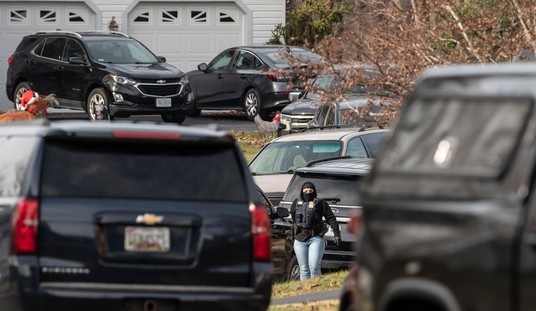
The battle for the future of Afghanistan is a battle between the Taliban and ISIS, and we are just sticking around to amuse Obama’s sense of whimsy.
The facts on the ground are now well beyond the point of being grim: The Taliban now controls more territory in Afghanistan than they have at any point since 2001, and they are continually expanding their territory at the expense of the Afghan security forces. They have completely taken over southern Kandahar, and Helmand and Farah are in imminent danger of falling under complete Taliban control as well. But the Taliban have also expanded their activity from their traditional Southwestern strongholds to include campaigns in Baghdis, and on the border of Tajikstan. Everywhere they turn, they have experienced success.
In fact, the biggest threat at present to the Taliban’s ultimate conquest of Afghanistan is that ISIS has established a foothold in Eastern Afghanistan in Nangarhar.
In spite of all the time, money, training, and equipment we have given the Afghan security forces in the last 14 years, they still find themselves outgunned, outmanned, and outwilled. The current fight within the Obama administration is whether Obama will slow play the withdrawal of the remaining 10,000 or so United States troops who are still in Afghanistan. The current plan is for roughly half the U.S. force to leave Afghanistan by the end of 2016, although some in the administration are pushing for a slower withdrawal.
It is pretty obvious at this point that unless we are willing to re-enter Afghanistan with a full-scale invasion force (spoiler: we aren’t), then the exact speed at which the remaining 10,000 U.S. troops withdraw isn’t going to make a lick of difference in the end. Personally, I don’t think it’s worth the life of another single United States soldier, or another single United States taxpayer dollar, for us to continue to be involved in the dispute over which brand of Islamic hellhole Afghanistan will end up being. Given the national course that we have clearly chosen, it’s time for us to get the last of our forces out sooner, rather than later.
That is not to say that our involvement in Afghanistan (or, for that matter, Iraq) has been for nothing. On the contrary, they have taught us valuable lessons about the fight against radical Islam going forward – and while the price for those lessons has been higher than it should have been, it is probably true that our innate stubbornness as a country would not have allowed us to learn these lessons for less.
Namely, I hope that we have learned that we have abused the entire purpose of the United States military over the course of the last 14 years by asking them to essentially act as armed civil engineers for the Great Society, Middle East division. The military is highly trained and more efficient than ever at killing people and breaking things. It is absurd, however, that we asked them to basically turn Iraq and Afghanistan into from third world cesspools into first world countries while also fighting an insurgency.
The way we have conducted the aftermath of these wars has been so backwards from a historical perspective that it is difficult to know even where to begin. I am at a loss for any other example in history where the winner of a military campaign almost bankrupted their own country trying to improve conditions in the vanquished territory. When all of Europe banded together to rout Napoleon’s army in retribution for the damage he had wreaked across the continent, they did not leave their artillery gunners behind to rebuild French farms. Instead, they stayed long enough for their guns to enforce a surrender, the exile of Napoleon himself, and an agreement for France to pay reparations to them. A contingent of troops stayed behind for the express purpose of making sure the agreed-upon reparations were paid and that Napoleon was not allowed to return to power. Having done this, they departed for home, with the understanding that violating the terms of the peace treaty would bring those same armies back to France to destroy it again.
This is how warfare is supposed to work, and we forgot it at our own peril. This is how it worked when Bismarck laid seige to Paris in 1870 and nearly wiped out the city. That’s how it worked at Versailles. Military occupations – when used effectively – serve the purpose of enforcing the earned terms of victory and should end when those have been achieved. They should not, for instance, be used to construct $43 million gas stations for the alleged benefit of the conquered territory.
It is easy, in retrospect, to second guess the foreign policy of George W. Bush, now that it has come to such abject failure (due, in no small part, to the fecklessness of his successor; however, Obama came to power in no small part because the American people had already sensed that it was doomed). Even in retrospect, though, it was without a doubt worth the risk. Bush believed that at least the possibility existed that Iraq and Afghanistan could be the subjects for a modern day modified Marshall Plan that would stand them as bulwarks of encouragement for democratic reform movements throughout the rest of the Middle East.
There was, after all, a lot to say for the Marshall Plan, as an alternative to, say, the Treaty of Versailles. Historians came to the conclusion that the cycle of war and reparations between France and Germany in particular played a significant role in the cataclysm that was World War 2. Throwing outside money at the devastated economies of Western Europe certainly had a more salutary historical effect than the crippling reparations imposed on the Germans at Versailles.
The chance that this idea might have worked also in Iraq and Afghanistan was worth the attempt to avoid the bleak future that faces us now, where reality has demonstrated that unlike the beneficiaries of the Marshall Plan, people in the Middle East do not want to live in liberal democracies. Or at least, that the ones who don’t are sufficiently well-armed and dedicated that they can basically bully and intimidate their way into power for the foreseeable future across this entire swath of the globe.
What are we to do, then, with an enemy who is willing to salt the earth of his own homeland solely for the reason that doing so diminishes the prestige of the United States military, from a PR perspective?
The answer, I think, is somewhat obvious at this point, even if it is uncomfortable to our modern sensibilities. We must return to the days where the military is used exclusively as an agent of destructive force, and to enforce the terms of negotiated peace. If your country’s leaders do something to provoke our military’s entrance into your country, you should know that they are there only to remove said leadership and destroy their military capability.
They will do this with such ruthless efficiency that you will willingly agree to pay all or part of what it cost us to invade you just to get them to leave your soil. If we have to confiscate your oil or pistachios or whatever to enforce this, we will. And you will know that if you break even the smallest term of the peace agreement that you signed, they will return, and you will abide by the terms of your agreement specifically to prevent that from happening.
The message must be clear: we are not here to rebuild your country, or (even worse) to build it up much better than it was before we arrived. We tried doing it that way and it didn’t work. You should consider doing that part of the cost of having provoked our wrath in the first place. Moroever, it merely provoked disrespect for the institution of the American military as a whole, which has had a negative impact on the stability of the entire globe.
I am not suggesting that we teach our military to be bloodthirsty butchers of civilians; I am merely suggesting that we allow them to return to doing what they are best at: being warriors. Being people who you don’t want to see in your country behind the business end of a gun, because they aren’t there to hand out flowers and chocolate.
In other words, let them be the military.
And for goodness’ sake, bring them home from Afghanistan before more of them get killed in the service of the half-assed objectives that we have them pursuing now. We are throwing their lives away on what is, let’s be honest, a literal highway to hell.













Join the conversation as a VIP Member